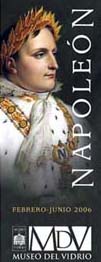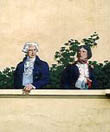| |
| |
MEXICO UNDER THE SPELL OF NAPOLEON
«Furor por Napoleón» (Mad for Napoleon) declared the Mexican daily El Norte, whilst the other Mexican daily Milenio described the exhibition as a beautiful «ventana a la historia de Francia» (window open on the history of France): the inauguration of the exhibition Napoleón held at the Museo del Vidrio in Monterrey took place on 14 February, 2006. The sumptuous evening was presided over by the president of honour HIH the Princess Napoléon, and Madame Marta Sahagún de Fox, wide of the president of the Mexican Republic, in the presence of Liliana Melo de Sada, president of the Museo del Vidrio, and Federico Sada González, president of Vitro, the Mexican glass-making company. Many personalities were present, including the Federal Minister for Culture and the authorities of the province of Nuevo Leon (of which Monterrey is the capital), Victor-André Masséna, Prince d'Essling, President of the Fondation Napoléon, general Robert Bresse, Director of the Musée national des Invalides, Bernard Chevallier, Director of the Musée national de Malmaison, The Préfet Mehnert, trustee of the Fondation Napoléon and Thierry Lentz, Director of the Fondation Napoléon.
This exhibition, the first on Napoleon in Mexico, is accompanied by a four-month cycle of talks.
For further information, here are some articles from the Mexican press:
http://www.milenio.com/nota.asp?id=264105
http://www.milenio.com/nota.asp?id=263553
http://mx.news.yahoo.com/060215/7/1mdhd.html
http://www2.nl.gob.mx/?P=leerarticulo&ArtOrder=ReadArt&Article=53235
http://www.elnorte.com/

|
|
|
| |
THIS MONTH'S ARTICLE
Napoleon and the Corsican Dilemma, by KRAJEWSKA Barbara
On receiving a royal scholarship, Napoleon went left Corsican to study in France where, suffering existential pain and permanent melancholy, isolated and marginalized, he would retreat into his inner self in attempt to resist the hostility of his French classmates. To resist; this was his first independent action. Barbara Krajewska brings us her reflections on Napoleon and his complex relationship with his native land, Corsica.

|
|
|
| |
200 YEARS AGO
23 February, 1806, ratification by Prussia of the Treaty of Paris.
After the victory at Austerlitz, Napoleon signed an offensive/defensive treaty with Prussia thereby alienating Austria. Faced with growing Prussian hostility (Prussia wanted more territory than she had received as part of the Treaty of Schönbrunn of 15 December, 1805), Napoleon imposed the Treaty of Paris, and as a result Prussia found herself under tighter strictures than at Schönbrunn, with no gain in territory, and furthermore, obliged to close her borders to British trade. The Prussian King ratified the treaty under duress but thereafter made every effort to live alongside Napoleonic France but at the same time actively wooed Russia in an attempt to avoid the fate of Austria.
On 26 February, 1806, a decree was passed ordering the erection of the Arc de Triomphe du Carrousel. The arch was to provide not only a triumphal entry to the Palais des Tuileries but also a celebration of the victories of the 1805 campaign. Napoleon awarded the contract to his favourite architects, Percier and Fontaine, and they in turn took their inspiration from the Arch of Septimius Severus in Rome.
But also:
24 February, 1806, death of J.-F. Collin d'Harleville (1755-1806), French playwright and comic poet, member of the Institut and elected to the Académie française in 1803. Author of many collections of poetry and of comedies such as Moeurs du Jour ou l'école des jeunes femmes (1800). (The mores of today, or the school for young women). He was renowned for such cheeky epithets as the following: «Eve sinned. Why so? Because she had been flattered. - An example followed by many women since.» and appreciated for his homely morality.
26 February, 1806, death of general Thomas-Alexandre Davy de La Pailleterie, known as Alexandre Dumas. Born on 27 March, 1762, in the French colony of Saint-Domingue son of the colonist Antoine Alexandre Davy, Marquis de la Pailleterie, and a native woman, Marie-Céssette Dumas, he became Général de division of the French army but poor health forced him to lave the armed forces durirng the Consulat period. He was the father of the novelist Alexandre Dumas père.
150 YEARS AGO
26 February, 1856, opening of the Congrès de Paris (26 February - 30 March, 1856) presided over by Waleski, French Minister for Foreign Affairs. In that it brought together delegates from each of the powers involved in the Crimean War (France, Britain, Russia, Prussia, Austrian Empire and Turkey…) the Congrès de Paris was a peace conference which brought the war to an end. It was above all the means for France, sidelined since the First Emmpire, to reaffirm her position as a great European nation, thus effacing memories of the Vienna Congress of 1815 and giving France a rome as an arbiter in European affairs. A treaty was therefore signed on 30 March, 1856.
On 29 February, 1856, the physiologist and doctor Claude Bernard (1813-1878) gave his inaugural lecture at the Collège de France.
Born into a modest family from the Beaujolais region of France, Claude Bernard, after studying pharmacy in Lyons, went to PAris to study medicine. On becoming an intern in the hospitals of Paris in 1839, he showed little interest in clinical matters. On meeting the physiologist Magendie (1783-1855), professor at the Collège de France, he became the latter's assistant. On spending time with his master, the young doctor developed a passion for physiology and soon made some important discoveries, such as the role of the pancreas in the digestion of fats, the presence of sugar in the bodies of diabetics, which in turn led him to the crucial discovery of the glycogenic function of the liver and to the isolation of glycogen, the body's fuel.
On Magendie's death in 1855, Claude Bernard succeeded him at the Collège de France where he gave his inaugural lecture on 29 February, 1856.
But also:
28 February, 1856, birth in Boissy-Saint-Léger of Joachim, 5th Prince Murat (1856 – 1932), great grand son of Prince Murat and Caroline Bonaparte.
Wishing you an excellent, Napoleonic, week.
Peter Hicks
Historian and Web editor
THE NAPOLEON.ORG BULLETIN, No 360, 17 February - 3 March, 2006
Interested in the work of the Fondation Napoléon? Why not participate, either generally or in a specific project, by making a donation.
© this Napoleon.org weekly bulletin is published by the Fondation Napoléon. Reproduction or all or part of this bulletin is forbidden, without prior agreement of the Fondation Napoléon.

|
|
|
|
|
|
|
|
|
|
|
|
|
|
STOP PRESS
8 February, sudden death of Charles Davout, Duc d'Auerstaedt. Born in Paris on 30 November, 1951, he was the eldest son of Léopold Davout, 5th Duc d'Auerstaedt, and of Madame Tsyuko Ayusawa. On the death of his father in 1985, he became the 6th Duc d'Auerstaedt. With little patience for high society, he led a simple life teaching French and History in job training centre (CFA). He was president of honour of the «Souvenir du Maréchal Davout» association.
The Fondation Napoléon presents it condolences to his family and friends.
THE FONDATION'S WEB SITES
Because of maintenance work on the servers hosting the sites produced by the Fondation Napoléon, napoleon.org and napoleonica.org, you may experience problems accessing these sites in the period from 22 to 27 February.
For the same reason, we will not be able to send out an information bulletin on Friday 24.
Please accept our apologies for the interuption in the service.
Irène Delage
responsable éditoriale
THIS WEEK in the MAGAZINE
WHAT'S ON
- Guided tours:
Napoleonic Milan, Milan, Italy
- Fairs:
The 13th International Napoleonic Fair, St Albans, UK
National Living History Fayre, Warwickshire Exhibition Centre, near Royal Leamington Spa, UK
- Re-enactments:
Napoleon at Golfe-Juan 2006: 11th re-enactment of the emperor's landing
- Book presentations:
Lucca, Bruno Mugnai is to present his book Soldati e milizie lucchesi dell'ottocento
- Conferences and Talks:
International conference, Delft, Netherlands
Consortium on the Revolutionary Era, 1750-1850, Atlanta, 2006
- Exhibitions:
Napoléon an intimate portrait, Tallahassee, Florida, USA
"Battle in a sittingroom." The Austerlitz wallpaper, Museo Napoleonico, Rome, Italy
In the Service of Napoleon. The Dutch in time of War 1792-1815, Delft, Netherlands
Napoleon on Campaign, the emperor's bivouac, at the Arc de triomphe de l'Etoile, Paris, France
- Entertainments:
Thursdays at the Museum of Florida History, Tallahassee, Florida, USA
Got a problem with the letter? Try the home page: http://www.napoleon.org
<<
|
|


